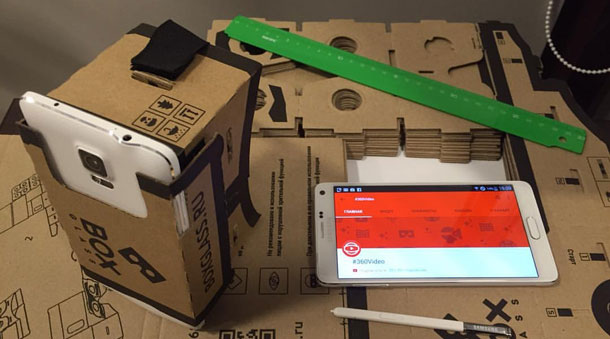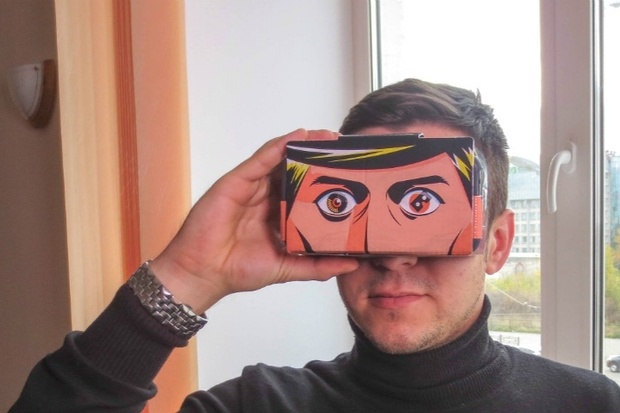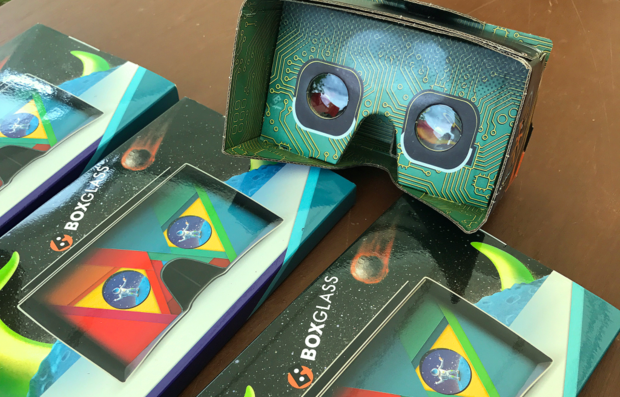Igor Melnikov, Boxglass: ''We cut our first VR glasses out of a pizza box by laser in Kalashnikov concern''
Izhevsk startupper about cooperation with Google, departure from Kazan IT Park
A shy startup from Izhevsk based on a concept of Google Cardboard virtual reality glasses has achieved noticeable success for 3 years of its existence – the backwater company managed to sell its VR glasses to same Google, become a partner of the Tatarstan State Committee for Tourism and increase its revenue 7 times. Founder of Boxglass Igor Melnikov told Realnoe Vremya what his startup came from, his first steps in the market and whether Russia had room for new VR projects.
''China occupied this niche very fast, and it is impossible to compete with it''
Igor, could you tell when you became interested in VR and how your startup appeared, please?
Even if I have a degree in Economy, I became a tech-savvy when I was a kid. However, fate did not coincide with this sphere until 2014 – I dealt with construction before VR.
Everything started with watching a live transmission of the Google I/O exhibition where the project Google Cardboard was represented. My partners Aleksandr Kopanev and Dmitry Demakov and I were very inspired by it and made our glasses in July already. They were made of cardboard: we had almost no starting capital but cardboard was an available and simple material. We did not use plastic because both its design and production was expensive. In addition, China occupied this niche very fast, and it is impossible to compete with it in terms of price. Then we made several plastic glasses, of course, but we refused this idea, including because it was not very ecologically friendly – it emanated a smell.
In general, when we made our first glasses, we did not think it would turn into a business, we just tried the very technology and we liked it.
In fact, you copied the idea of Google, but are there any differences between your products?
Initially, we made a construction like Google. However, then we noticed several disadvantages of such glasses. They need to be additionally assembled and stuck — it is one of the inconveniences for users. We got rid of this gap: we made the construction assembled. In addition, the glasses were folding.

''My partners Aleksandr Kopanev and Dmitry Demakov and I were very inspired by it and made our glasses in July already. They were made of cardboard: we had almost no starting capital but cardboard was an available and simple material.'' Photo: geek-bag.ru
In general, Google doesn't distribute these glasses in Russia – China does it instead. We, in turn, are different from them by both quality and construction.
How much money did you invest to launch the project?
We spent about 500,000 rubles on Boxglass.
''VR market still has many options, one just needs to do experiments''
How did you enter the market? What were your first steps?
We started with a website, tried to sell the glasses there, but the first results were not very successful. It lasted so until we received a request from Ford – they ordered a lot of branded glasses. Then we understood that b2b was our major market.
We also realised that right content was a priority, this is why we started to cooperate with companies that made it – we offered them our VR glasses. The thing is that it is one thing to make a content, but you won't be able to demonstrate it or see without a special device, VR glasses are needed.
Can a startup enter the VR market in Russia now? Will there be room for it?
VR is a completely new, developing market. I've recently listened to Andrey Doronichev's speech from Google who very accurately described the current state of the market: he said VR still didn't have its own Google and Facebook. In other words, the market is open. Yes, there are big corporations, but always there is much room for cool and ambitious startups. VR still has many options, one just needs to do experiments.
Do you see potential opponents among startups in Russia?
We don't have strong opponents in VR glasses: cardboard glasses are made in several cities, that's it. As for software, Russia has such cool companies as Interactive Lab, Cerebrum and Fibrum, but I can't say they're our direct rivals. They are mainly our colleagues and partners.

''The thing is that it is one thing to make a content, but you won't be able to demonstrate it or see without a special device, VR glasses are needed.'' Photo: udmurt.media
''They don't make a rubber strap, so that people won't use VR cardboards for more than 10 minutes''
How do you work now? Where is your assembly plant? Where do you take your materials from?
We bring some spare parts from China, print all cardboard and assemble in Izhevsk. This choice was made because it allows us to keep the price at a level and not to lose quality at the same time. By the way, our printing office is also in Izhevsk.
Where do the lenses come from?
At the moment our lenses come from China, but we're looking for production options in Russia (there are certain ideas, but it isn't a mass production yet). They're made in defence enterprises, in addition, they're made of glass only, which is very expensive – only the lens is more expensive than the whole cardboard. While in China everything is done, there is no need in creating anything – you got what you ordered. So we chose the road of the least resistance.
Is the quality of the lenses good? Because people start feeling giddiness and other feelings after 5-10 minutes in the cardboard (not necessarily yours). Do your users complain?
We excluded about five lens producers first. China can also be different. In general, as very Google says, cardboard glasses is a VR tester. For instance, they don't make a rubber strap, so that people won't use VR cardboards for more than 10 minutes – they can have a negative impression of the technology. Neither Google nor we want it, so we don't make the strap as well – the glasses need to be held by hands. In general, 5 minutes are the maximum what the cardboard glasses are able to do because it doesn't have settings for interpupillary distance (everybody's distance is different), focus distance, etc.
Is it true that Kalashnikov concern helped you in glasses production?
It was at the beginning – then our mate rented a room in the very concern. We cut our first VR glasses out of a pizza box by laser in Kalashnikov concern. So the concern helped us, but indirectly. We also work with them. The concern has changed a lot after 3 years, and we speak the same language with the new management. They also try to help us, but maths is on the front line here – now we're not going to buy lenses three times more expensive.
How many glasses have you made for 3 years? How many glasses have you sold?
We've made about 350,000 glasses throughout the 3 years. We've sold all of them.

''We bring some spare parts from China, print all cardboard and assemble in Izhevsk. This choice was made because it allows us to keep the price at a level and not to lose quality at the same time.'' Photo: checkboxes.ru
''We sold our glasses to very Google''
Could you tell about big clients? What companies turned to your cardboard glasses?
Firstly, we sold our glasses to very Google – about 20 items. Dixy commercial chain can be remembered among big clients: they staked VR glasses within a loyalty programme for sticks. The Moscow Zoo shot a 360-degree video in aviaries and loaded this content on YouTube, then people purchases VR glasses in a souvenir shop and watched these videos by a QR code. In addition, we worked with the A.S. Pushkin museum, 2x2 channel, Sberbank and Yandex.
Did you receive state orders? You seemed to count on the Ministry of Defence in the past.
We paid more attention to the Ministry of Defence than they did (laughing). But the interaction channel with the ministry was unreliable, and there was a drain of money. So it did not work out. As for state orders, now I think we can take the same Pushkin museum – it is, in fact, the Ministry of Culture, and the Moscow Zoo – it is the municipality.
Do you have clients from Tatarstan?
We make a project together with the State Committee for Tourism of the Republic of Tatarstan: both cardboard glasses as promotion equipment for exhibitions and branded plastic glasses. But the project is in the process now, it hasn't been demonstrated anywhere yet.
Are you still a resident of Kazan IT Park?
We were residents in 2016-2017, now – no.
Why?
We went back to Udmurtia to promote entrepreneurship there. But I will say from the beginning: now we're opening our subsidiary company in Tatarstan that will be a resident of IT Park.